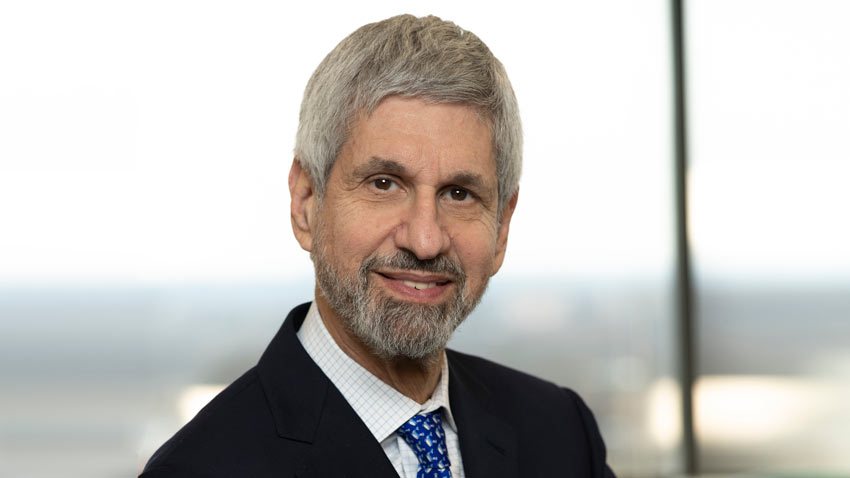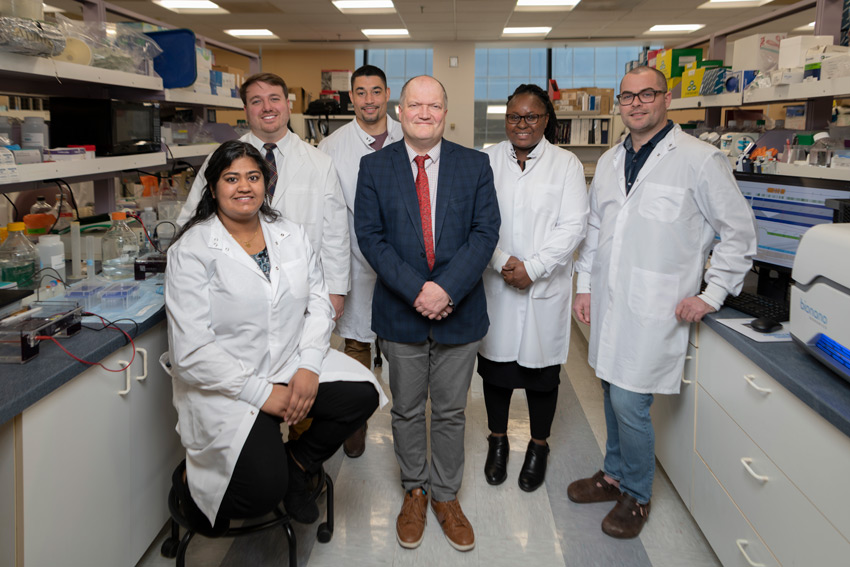CHILDREN'S NATIONAL RESEARCH INSTITUTE ACADEMIC ANNUAL REPORT 2021

Spotlight
Mark L. Batshaw, a world-class leader and clinician-scientist, retires as chief academic officer
2021 ends the tenure of Mark L. Batshaw, M.D., as Chief Academic Officer and Director of the Children’s National Research Institute after more than 23 years. Several long-time colleagues and collaborators at Children’s National and beyond offered their reflections on Dr. Batshaw’s career.
Building a world-class pediatric academic medical system
From the time he joined Children’s National Hospital in 1998, Dr. Batshaw drove continued growth of research and academics.
“I’ve had the privilege of knowing and working with Dr. Batshaw for more than 20 years,” said Kurt Newman, M.D., President and CEO of Children’s National. “As a pediatric academic medical center, educating and training new pediatricians and conducting bench-to-bedside research is foundational to our mission and success. As Chief Academic Officer and Physician-in-Chief, Dr. Batshaw has enjoyed a long and distinguished career that transformed our research enterprise, including increasing our research funding so that we now rank seventh in NIH pediatric funding.”
“Mark Batshaw, leading a few good men and women, has within one decade converted Children's National from a clinical institution to a top pediatric academic institution,” added Mendel Tuchman, M.D., former chief research officer at Children’s National. “He worked tirelessly to recruit the best scientists and staff from all around the country to join him in this mission. Mark was involved in every large federal grant, writing many of them himself, to build the research infrastructure of the Children's National Research Institute.”
Career capstone: The Children's National Research & Innovation Campus
Perhaps the biggest monument to his administrative leadership at Children’s National is the new Research & Innovation Campus. Over the course of the next few years, it will continue to grow into a true one-of-a-kind pediatric research and innovation hub. At the Research & Innovation Campus, breakthrough discoveries can more quickly be translated into new treatments and technologies benefiting kids.
"Dr. Batshaw's legacy in building academics at Children's National is as broad as it is deep. His impacts on research and education have been profound,” said Stephen Teach, M.D., MPH, chair of Pediatrics at Children’s National. “Most importantly, they have laid the groundwork for us to reach even higher heights."
Defining clinical care and research for children
All the while, though, Dr. Batshaw has also continued his efforts to revolutionize the clinical care of rare diseases and developmental disabilities for children around the world.
Rare diseases
This includes an expansive body of work to improve outcomes for genetic disorders of the urea cycle.
“Mark partnered with me to bring gene therapy into the clinic for liver metabolic diseases. He had the courage to go where no one had gone before,” said James M. Wilson, M.D., Ph.D., director of the Gene Therapy Program at the University of Pennsylvania School of Medicine. “This remarkable 28-year partnership has had its challenges, but I am proud that we have stayed the course and now have a gene therapy for OTCD (ornithine transcarbamylase deficiency) in late stage development, with other platform technologies on the way such as mRNA and genome editing.”
Dr. Batshaw has also worked with colleagues at Children’s National, including Dr. Tuchman, former chief research officer, and Marshall Summar, M.D., director of the Rare Disease Institute, as well as others around the world to explore the biological mechanisms of these disorders and find new ways to treat them.
Among other findings, this work helped bring three new drugs to FDA approval for treating urea cycle disorders—compounds that have redefined the most severe forms of these diseases from fatal diagnoses to treatable conditions.
Developmental pediatrics
Dr. Batshaw dedicated his entire career to caring for children with developmental disabilities. He has published more than 200 articles and reviews. He is senior editor of the classic textbook, Children with Disabilities, now in its eighth edition, widely considered the premier reference on these topics.
“Mark has influenced so many people with his vision in developmental pediatric research both inside and outside his areas of research,” said Vittorio Gallo, Ph.D., Interim Chief Academic Officer and Interim Director of Children’s National Research Institute at Children’s National who formerly directed the hospital’s Center for Neuroscience Research. “As a developmental neuroscientist, I came to Children’s National to establish a research center and a research program that was based on a vision I shared with Mark. We both believe that understanding the developing brain is fundamentally important to elucidate abnormalities that occur in neurodevelopmental disorders. He inspired me to recruit many investigators who work in these areas and to build our District of Columbia Intellectual and Developmental Disabilities Research Center (DC-IDDRC) at Children’s National, which has grown into a multi-institutional consortium with George Washington University, Howard University and Georgetown University.”
According to Michael J. Guralnick, Ph.D., director of the Center on Human Development and Disability at the University of Washington, “Mark has been the most influential person in the field of developmental disabilities in the last half-century. He is without peer, in my view. He has been the catalyst for many of the achievements that we’ve had in these fields.”
Dr. Guralnick, who worked with Dr. Batshaw across many initiatives, including the NIH-funded Intellectual and Developmental Disabilities Research Centers, attributes those successes to Dr. Batshaw’s unique skills set, including his uncanny ability to understand the intricacies of clinical work, research, administration, and leadership—and how people from all those areas can be drawn together to drive work toward the desired outcome.
Said Dr. Newman from Children’s National, “His incredible dedication throughout his entire career to caring for and improving the lives of children with disabilities is noteworthy and has earned him the respect of his peers. His many contributions to our understanding of child development and behavior, including as the senior editor of the definitive textbook Children with Disabilities, now in its 8th edition, are also a part of his lasting legacy in the field.”
Establishing communities of collaboration and mutual respect
Whether research, clinical care or academic leadership, colleagues, staff members and trainees agree that Dr. Batshaw also serves as a model for collaboration, integrity and a culture of mutual respect.
“His tenure at Children’s National has strengthened the way we educate and train the next generation of doctors, researchers and clinician-scientists. We are one of the best children’s hospitals, and pediatric research institutions, in the country because of Dr. Batshaw’s efforts and that of his colleagues across our health system,” Dr. Newman pointed out. “I am so thankful to Dr. Batshaw for the leadership he brought to Children’s National and his commitment to our core values.”
Dr. Tuchman notes that “His hands-on approach makes him unique among distinguished academic leaders. His energy and drive are unparalleled and virtually impossible to match. His optimism and high confidence in success against the odds have led to many unexpected triumphs. I had the honor of working closely under Mark for 20 years and owe him a substantial part of my academic progress. All of the above followed his distinguished career of research in urea cycle disorders and developmental disabilities. Last, but not least, are his wonderful qualities as a human being, including his dedication to his wife, Karen, and his children and grandchildren.”
“His respect for and understanding of perspectives and disciplines has been key and is reflected in all the work that he does,” Dr. Guralnick said.
“Mark is indeed the consummate physician-scientist,” Dr. Wilson added. “However, what makes him special in my mind is his integrity and kindness.”
Read Dr. Batshaw’s own reflections and his thoughts on the future of pediatric medicine.

